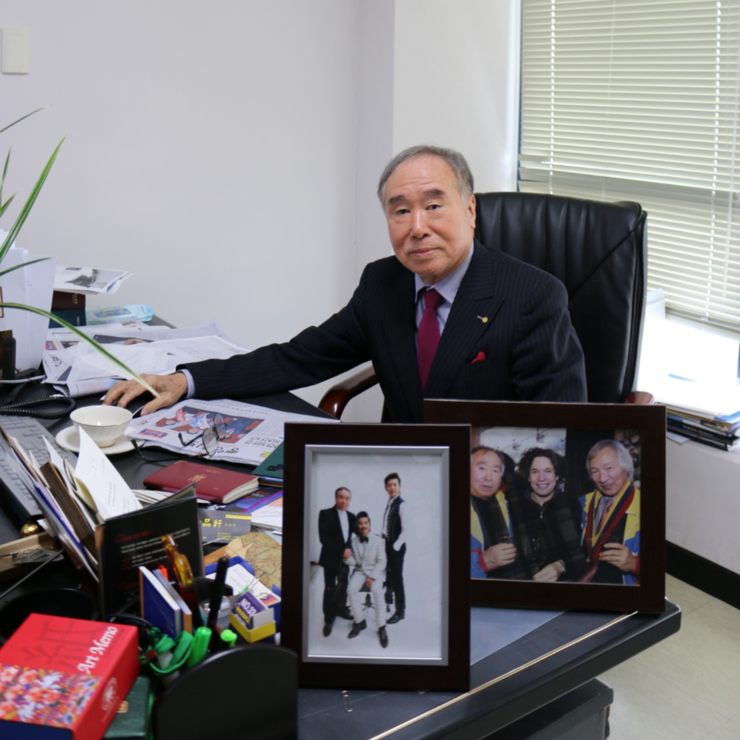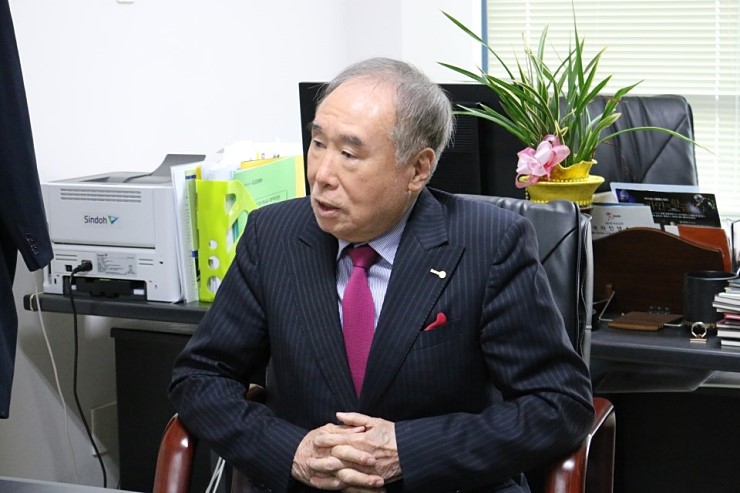 |
| ▲ Professor Lee Jong-duk is taking the photo with his memorial pictures. |
Many Dankookians (students of Dankook University) might have heard about the Dean of the Academy of Arts, Lee Jong-duck. Lee has made many contributions to pop culture, which was not popular at all when he was a teenager. He also helped many artists achieve their dreams by organizing and taking charge of events that exposed Koreans to international arts and in some cases, launched the careers of local talent. For example, in 2002, he helped an international ballet group perform for the first time in South Korea. He fought hard for the opportunity and eventually secured a platform for the group is known as ‘Stuttgart’ to perform. Ballerina Kang Su-jin was working with the group at that time. Nowadays, she is a well-known, successful ballerina. In 1974, Mr. Lee also conducted a car parade from Kimpo Airport to Gwanghwamun Gate in honor of Chung Myung-hun, who took second place in the Tchaikovsky Piano Competition. There are many other examples of Mr. Lee supporting artists, so we decided to learn more about his life through an interview.
Q: What is your secret to becoming a successful cultural and art administrator?
I’ve always been involved with cultural artists and interact with them continuously. We talk a lot, so that is why I am so interested in this area. I also think that because of these artists, I was successful, so you could say that they helped me a lot in this journey too.
Q: What is your most memorable or honorable moment while you worked as an art administrator?
A: In 1972, I participated in the München Olympic as the leader of the National Dance Company of Korea (NDCK). The NDCK performed in the opening ceremonies of the Olympics and after that, they went on to tour 24 countries. This was promoted well and was considered a great success. When we came back, the prime minister gave us all medals. For me, this was a very monumental and honorable memory. For the country, this represented a cultural exchange between countries. I think this kind of experience boosted our pride as a nation and gave us a wider perspective of the arts. Through these experiences, Korea’s art administration and its level of performances developed.
Q: In the past, pop culture wasn’t recognized well and wasn’t familiar to people. Did you have any difficulties because of this?
A: I sure did. At that time, most of the arts centers and theaters didn’t host pop culture performances. I thought this wasn’t right, so I started inviting and giving stage opportunities to pop culture singers. During their first performances, people argued that I shouldn’t allow pop singers opportunities to perform in the arts center, but now it is natural and most people don’t have any objections.
In my opinion, we have to think about pop culture as equal to traditional or classic arts. If we emphasize traditional or classic fields only, then our country’s arts would never develop. Musicals, rap, or even hip hop fields, which are popular in modern society today, have all advanced through the promotion of pop culture.
Q: What are the weaknesses of Korea’s art culture?
The people of Korea are not as interested in culture and arts as many people expect. That is why the Graduate School of Culture and Arts is very important in order to foster more interest in this area. For instance, making a Jukjeon festival was my dream, unfortunately, it did not happen. However, because I wanted more people to know about Dankook University (DKU), I organized a festival that is now held annually. However, I was very disappointed because DKU didn’t seem to appreciate my efforts in trying to generate interest in arts in culture. I hope that in the future, there are more people in DKU that are bright and very active in this scene.
 |
| ▲ Professor Lee is interviewing with the Dankook Herald. |
Q. You have worked as the CEO in the government theater since 1995. Is there any fulfilling or worthwhile memory that you can share from this experience?
A: When I worked at the Seongnam Arts Center, I invited ‘Gustavo Dudamel and The Simon Bolivar Youth Orchestra’. It was their premier performance in Korea. After the performance, they performed at the Seoul Arts Center and Gustavo Dudamel became LA orchestra’s permanent conductor and The El Sistema (originally made as a free education program to the poor children, now plant as a music education program to children in Venezuela) spread in Korea. I gave a lecture about El Sistema at Ewha Woman's University.
And when I was at the Chungmu Arts Center, we made the musical Frankenstein. We earned 11.5 billion for these performances. It was the first and only theater that made musicals autonomously.
Q: Lastly, do you have any comments that you would like to make to Dankookians?
A: You must be honest. There must be trust and you must have a challenging spirit. Consideration towards others, especially those weaker than you, is your top priority. Always think of things from another point of view. Students should also stay positive and try to finish their work on the spot. This is helpful to both themselves and the people around them. I also recommend participating in more volunteer work in your youth. Listen to others and try to apply those lessons to your own life. Make a lot of friends while you’re still in school. Ask more questions because you won’t get to ask any once you graduate and step out into society. Be brave, open your mind, and try your hardest.
Professor Lee worked behind the stage to bring about many successful performances and invested his efforts in shows and performers his entire life. As a result, he has been credited for his achievements and runs lots of performances and arts institutions. Before pop culture and arts were established in Korea, he worked in the field and strengthened its roots in the community. Even though there were many difficulties, he tried and tried and his efforts led to many innovations and developments with each step. He focused on growing manpower in the art field since he started working as an art administrator. He believes that experienced artists can train new and great artists and help develop Korea's artistic fields even further.
Mak Hao Yang, 신지희, 김도현 dankookherald@gmail.com

![[Campus Magnifier] Let's Surf the Library!](/news/photo/202404/12496_1765_4143.jpg) [Campus Magnifier] Let's Surf the Library!
[Campus Magnifier] Let's Surf the Library!
![[Campus Magnifier] Let's Surf the Library!](/news/thumbnail/202404/12496_1765_4143_v150.jpg)





